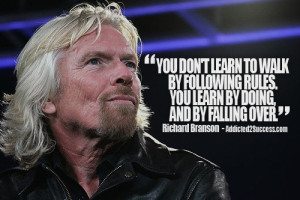Success Advice
10 Ridiculous Beliefs That Are Killing Your Success

You have big dreams!
But there are too many obstacles in your path, aren’t there?
You aren’t as ‘lucky‘ as those who have made it big.
Do you really believe that?
What if the only things holding you back from success are your limiting beliefs?
What if these ‘limitations‘ are only in your mind?
Our reality is defined by what we believe.
Some of these beliefs are useful, but others are simply shackles that hold us back.
Many of these beliefs are nothing short of ridiculous!
After all, haven’t thousands of people faced the same ‘problems‘, had the same ‘limitations‘, and yet attained outstanding success and built fortunes?
Here are 10 ridiculous beliefs that are killing your success…
1. “I don’t have enough time”
You are really busy aren’t you?
We all are!
Yet people like Sabeer Bhatia (founder Hotmail), Noah Kagan (founder AppSumo) and many others built startups while holding full time jobs.
Look closely – can’t you find time anywhere?
What activities in your life you can eliminate, outsource, or delegate?
Get rid of TV, movies, social networks, social outings, etc.
What’s more important – your dream or watching reruns of ‘Friends’?
2. “I need to wait for the perfect moment”
Someday…
Every 3 out of 10 people I meet want to become an entrepreneur…someday.
Most of the time, someday never comes!
Because there is no perfect moment. You will always face challenges.
But why are you waiting for the perfect moment?
Often, it’s because of the next belief…
3. “I only have one chance”
Ever heard of a company called Traf-O-Data?
I guess not. After all, it was a failure.
But everyone has heard of Microsoft!
Here’s the surprise: Traf-O-Data was actually the first company founded by Bill Gates and Paul Allen!
Numerous people have failed several times before finally attaining success.
You have multiple chances to get it right.
Never give up, even if you are like 99 years old!
4. “I don’t have enough money”
Of course you don’t! Who does?
Is the business idea you have in mind impossible without a large investment?
Just ask yourself “What business can I start with the limited money that I do have?”
An easy way to make revenues with little investment is to offer services like consulting, website maintenance or maybe even ghost-write!
If you have a ‘dream business‘ in mind, you can start that after you have made enough money with your first venture.
Elon Musk, Paypal founder, now has a company that develops spacecraft – SpaceX. He didn’t have the money to build SpaceX 25 years ago.
That didn’t stop him!

5. “I don’t have an Ivy League education”
Seriously, do you think that will stop you?
An Ivy League degree helps, but is it essential?
Richard Branson was dyslexic, Bill Gates and Steve Jobs were dropouts.
You don’t need a fancy education. You just need the right skills.
6. “I don’t have the right skills”
Are planning to build the next rocket to mars or develop a cure for cancer?
If not, how is this a drawback?
Most skills that you need to become a CEO or build a successful company can be learned.
Jeff Walker, one of the titans of internet marketing knew nothing about the field when he started out!
If you don’t have time to learn, team up with a co-founder or just hire people with the right skills.
7. “I don’t have connections”
If you don’t have them, what’s stopping you from going out there and building them?
Attend industry events, startup events, join a networking group or simply use Twitter or LinkedIn to build your network.
Is that really difficult in today’s digital world?
8. “I have responsibilities”
Yes, you do.
Leo Babauta, founder of Zen Habits, has six kids and he also had a full time job. That didn’t stop him from building one of the biggest blogs in the world!
Remember, ‘The Pursuit of Happyness’? It’s based on a true story. What drove Chris Gardner to succeed and make millions began with the basic need to put a roof over his son’s head.
If you have a family to take care of, isn’t that a bigger reason to work towards greater success?
9. “I don’t have enough experience”
Nearly every person you meet will tell you that you don’t have enough experience.
Richard Branson started his first venture when he was 16. If corporate experience was a key factor would his 400 companies exist today?
If you have a great idea and have the means to execute it, how is experience a limitation?
10. “I need to be perfect”
I was guilty of this myself!
I spent 6 months developing my first product, which a shamefully low number of companies bought.
Eric Ries, made a similar mistake with his first company IMVU, which inspired him to write ‘The Lean Startup’.
In this bestseller, he advises us to create a ‘minimum viable product‘ for your target customers. Develop the product further based on their feedback rather than on your assumptions.
We want things to be perfect because we are afraid of failure.
Ironically, our quest for perfection is what often causes us to fail!
Believe that you can!
“Whether you think you can, or you think you can’t – you’re right.” –Henry Ford
If you want to realize your dreams, take a good look at what you believe your limitations are. Question your beliefs and you will discover a whole new world of possibilities!
What other beliefs are holding you back from success?
Did You Know
This Move Can Help You Keep More of Your Income
What if keeping more of your income wasn’t about earning more, but choosing a smarter place to live?

Living more cheaply often makes the biggest difference when money is tight. If rent feels too heavy or bills climb faster than expected, changing where you live might help a lot. (more…)
Business
How to Build a Brand That Actually Connects (For Businesses of Any Size)
Brand growth in 2026 isn’t about shouting louder; it’s about clarity, consistency, and human connection that customers genuinely trust.

In the middle of a busy workday, it’s easy to view brand building as a luxury. Honestly, we often treat it like a coat of paint we apply after the house is built. But as we navigate the landscape of 2026, it’s become clear that branding is actually the foundation. (more…)
Business
High Stakes Leadership Habits That Work in Any Business
When volatility is normal and pressure is constant, energy sector leadership reveals the habits that help entrepreneurs build trust, adapt fast, and execute with long-term focus.

Oil and gas leaders operate in a world where mistakes can prove to be very costly. Here, timelines are tight and risks are as real as can be. As a result of all this, the sector offers useful lessons for entrepreneurs and business owners. (more…)
Shift Your Mindset
SEO Secrets That Separate Struggling Hustlers from Thriving Winners
Zero-click searches and AI Overviews are crushing old tactics – the brands building unshakable SEO authority are pulling ahead fast.

One guy pours endless hours into blog posts, tweaking meta tags, begging for links – traffic flatlines. Another quietly builds something solid, updates once a quarter with fresh proof, gets cited in AI answers… and suddenly leads roll in without him lifting a finger for ads. (more…)
-

 Business4 weeks ago
Business4 weeks agoThe Salary Shift Giving UK Employers An Unexpected Edge
-

 Business3 weeks ago
Business3 weeks agoWhy Entrepreneurs Should Care About AI Automation Testing
-

 Business4 weeks ago
Business4 weeks agoWhy Smart FMCG Entrepreneurs Outsource What They Can’t Automate
-

 Business3 weeks ago
Business3 weeks agoWhat Every Business Owner Should Know Before Investing in API Integration
-

 Did You Know4 weeks ago
Did You Know4 weeks agoThe SEO Traps Even Experienced Marketers Fall Into
-

 Business3 weeks ago
Business3 weeks agoWhy Smart Entrepreneurs Are Quietly Buying Gold and Silver
-

 Business2 weeks ago
Business2 weeks agoHow Smart Brands Use Instagram Data to Outperform Competitors
-

 Business2 weeks ago
Business2 weeks agoThe Paradox of Modern Work: Can Tech Make Us More Human?





























29 Comments